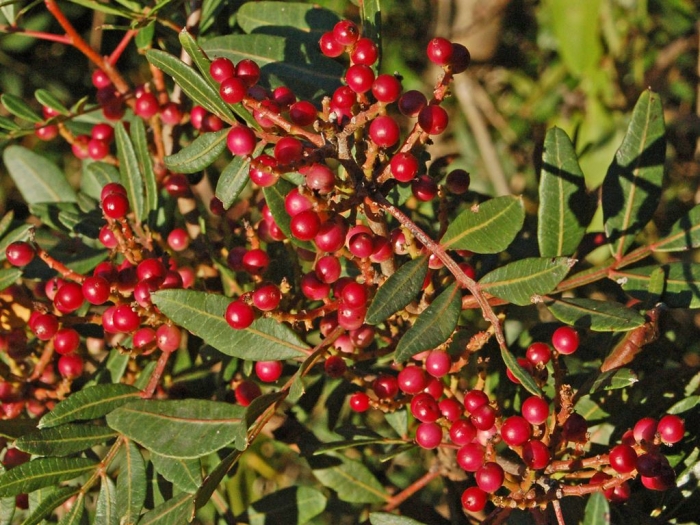Mastic Tree
(Pistacia lentiscus)
Mastic Tree (Pistacia lentiscus)
/
/

Ettore Balocchi
CC BY 2.0
Image By:
Ettore Balocchi
Recorded By:
Copyright:
CC BY 2.0
Copyright Notice:
Photo by: Ettore Balocchi | License Type: CC BY 2.0 | License URL: https://creativecommons.org/licenses/by/2.0/ | Uploader: Ettore Balocchi | Publisher: Flickr |






















































Estimated Native Range
Summary
Pistacia lentiscus, commonly known as Mastic Tree, is a dioecious evergreen shrub or small tree belonging to the genus Pistacia, native to the scrub and open woodlands of the Mediterranean region. It can grow up to 4 meters (13 feet) tall, but when allowed to grow freely and age, it often becomes a tree of up to 7 meters (23 feet). The Mastic Tree is characterized by its dense, bushy appearance, with older specimens developing large trunks and numerous thicker and longer branches. Its leaves are compound, typically with three to five leaflets, and are dark green and glossy. The very small, inconspicuous flowers are greenish-white, with male flowers featuring five stamens and female flowers with a three-part style. Following flowering, it produces small, round, red to black drupes that mature in autumn. The fruit is edible with a tart, raisin-like flavor, though not commonly consumed.
The Mastic Tree is valued for its resilience and attractive appearance, making it a popular choice for gardens, resorts, and urban landscapes. It is particularly noted for its aromatic resin, which has been used historically for a variety of purposes, including chewing gum and varnish. The tree is also appreciated for its ability to thrive in challenging conditions, including limestone areas and saline environments. It requires minimal care, doing best in full sun with low water needs and well-drained soils. While it resists mild to heavy frosts, it prefers milder winters. Potential problems include susceptibility to scale insects and fungal diseases if grown in overly moist conditions.CC BY-SA 4.0
The Mastic Tree is valued for its resilience and attractive appearance, making it a popular choice for gardens, resorts, and urban landscapes. It is particularly noted for its aromatic resin, which has been used historically for a variety of purposes, including chewing gum and varnish. The tree is also appreciated for its ability to thrive in challenging conditions, including limestone areas and saline environments. It requires minimal care, doing best in full sun with low water needs and well-drained soils. While it resists mild to heavy frosts, it prefers milder winters. Potential problems include susceptibility to scale insects and fungal diseases if grown in overly moist conditions.CC BY-SA 4.0
Plant Description
- Plant Type: Shrub
- Height: 15-25 feet
- Width: 20-30 feet
- Growth Rate: Slow
- Flower Color: N/A
- Flowering Season: Spring
- Leaf Retention: Evergreen
Growth Requirements
- Sun: Full Sun
- Water: Medium, High
- Drainage: Fast
Common Uses
Bird Garden, Drought Tolerant, Hedges, Low Maintenance, Salt Tolerant, Street Planting
Natural Habitat
Scrub and open woodlands of the Mediterranean region
Other Names
Common Names: Lentisk , Chios Mastictree , Lentiscus , Lentisk , Mastic , Masticshrub , Mastictree , Mastix-Pistazie , Mastixbaum , Mastixstrauch
Scientific Names: Pistacia lentiscus , Lentiscus vulgaris , Pistacia narbonensis , Terebinthus vulgaris
GBIF Accepted Name: Pistacia lentiscus L.